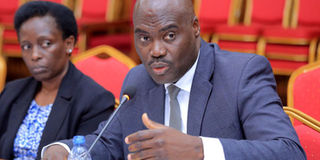MPs order government to recover Shs200b from Umeme

Discussions. The Managing Director of Uganda Electricity Distribution Company Limited, Mr Paul Mwesigwa, before the Committee of Commissions, Statutory Authorities and State Enterprises at Parliament on Wednesday. PHOTO BY DAVID LUBOWA
Members of Parliament on Committee of Commissions, Statutory Authorities and State Enterprises (Cosase) have asked government to recover Shs230b from Umeme, the national power distributor, from the assets they have been using without burdening consumers.
However, Mr Selestino Babungi, the Umeme managing director, yesterday said they do not owe any money to government.
Mr Babungi said the money was accrued after Electricity Regulatory Authority (ERA) declined to include the cost in the tariff in 2013 for them to recover it from the customers on behalf of government.
“We don’t owe any money to Uganda Electricity Distribution Company Limited (UEDCL). The Shs200b is subject to the regulator. The regulator was not putting the money in tariff. Therefore, we are not collecting it. We cannot pass on what we have not collected. Previously, they were putting in the money. We would collect it and pay UEDCL. When ERA stopped putting it in the tariff, we stopped collecting it,” Mr Babungi said.
Kira Municipality MP Ibrahim Ssemujju said the agreements that the technical team signed on behalf of government were tilted in favour of Umeme.
“If you are looking for money to reinvest, assuming it is a cow you are milking and Umeme is taking two litres every day, why don’t you reduce the litres Umeme is taking for you to recover this money? Why do you always think you must burden the consumers? How much do they earn from this concession that you fear to revise? The fear of the Auditor General (AG) is that the assets are depreciating, Umeme will walk away and we will have no assets,” Mr Ssemujju said.
Budadiri East MP Vincent Woboya asked that documents be provided for scrutiny to be sure what each of the entities is entitled to.
Umeme
Mr Allan Rwakakooko, the Umeme senior legal manager, said UEDCL lost its entitlement on assets after the regulator declined to approve that the money be recovered from the tariff.
“The regulator in 2013 decided to exclude the fees from the tariff. Those costs should have been born by the final consumer. It would mean that the tariff be increased to cover that cost.
“The question of entitlement was suspended by the regulator. I think every year since then, the entitlement is not approved and therefore the invoice not issued because there is no entitlement as far as Umeme is concerned,” Mr Rwakakooko said.
The AG’s 2017 report states that the lease and assignment agreement between UEDCL and Umeme of May 17, 2004 entitles UEDCL to depreciation and return on investments on the assets assigned for use to Umeme. However, it noted that UEDCL has neither invoiced nor received such income since the agreement.
“Umeme has not paid this money,” the report states.
Ms Ziria Tibalwa Waako, the ERA chief executive officer, said the issue had been brought to the attention of Finance Minister who set up a committee to look into the matter.
She, however, did not disclose the members of the committee.
“If government determines that they have a cost or obligation that they need to recover from the tariff, they will issue us a policy. The minister of Finance invited us as a regulator. In that meeting, he agreed he is going to set up a committee,” Ms Waako said.
Mr Paul Mwesigwa, the UEDCL Managing Director, said: “This amount has been accumulative for 15 years. For us to balance, you cannot put the Shs200 billion on tariff at once. The regulator can work on the reasonable amount that can be added gradually. You can start gradually putting something. The fact is that if an asset depreciates, you have to replace it tomorrow and you will not replace it on borrowing.”
Resolution
Cosase vice chairperson Ibrahim Kasozi asked that the Minister of Finance, ERA, Umeme and UEDCL officials be invited on February 27 to find a solution on how to recover the money without burdening the consumer.




